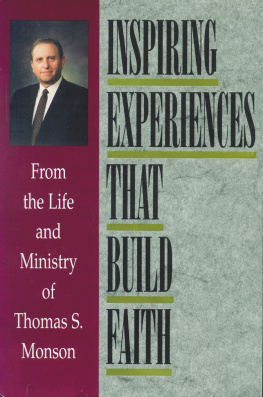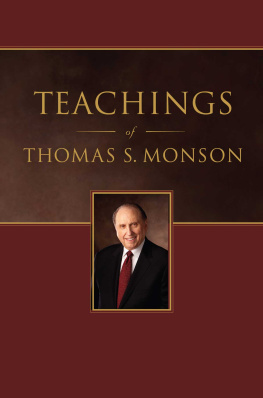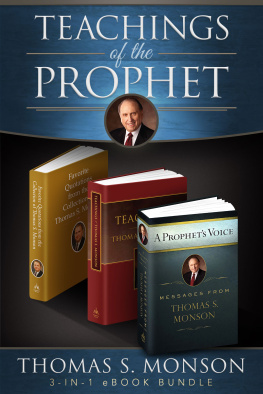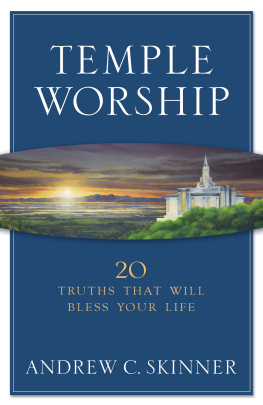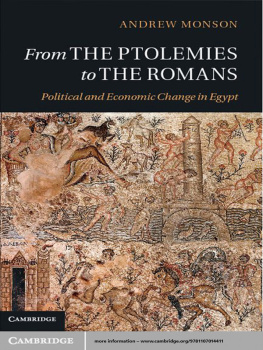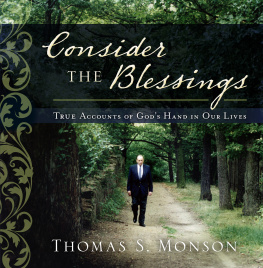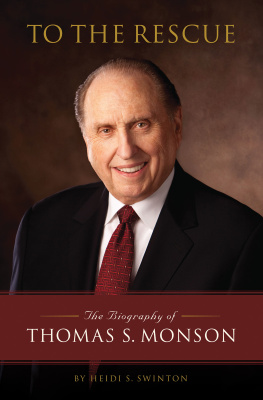Inspiring Experiences That Build Faith
From the Life and Ministry of Thomas S. Monson
Thomas S. Monson
1994 Thomas S. Monson.
All rights reserved. No part of this book may be reproduced in any form or by any means without permission in writing from the publisher, Deseret Book Company (permissions@deseretbook.com), P.O. Box 30178, Salt Lake City Utah 84130. This work is not an official publication of The Church of Jesus Christ of Latter-day Saints. The views expressed herein are the responsibility of the author and do not necessarily represent the position of the Church or of Deseret Book. Deseret Book is a registered trademark of Deseret Book Company.
A Lesson in Reverence
A Lesson in Reverence
When I was a boy in Primary, one day as we left the chapel for our classrooms I noted that our Primary president, Melissa Georgell, remained behind, sitting alone on the front row of benches. I paused and observed her and saw that she was weeping. I walked up to her and said, "Sister Georgell, why are you crying?"
She wiped her eyes with her lace handkerchief and said, "I feel that I'm a failure as a Primary president. I can't control the Trail Builders. Could you help me, Tommy?"
I promised her that I would. What I didn't know then is that I was the source of her tears. She had effectively enlisted me to aid in achieving reverence in our Primary. And we did achieve it.
The years flew by. Melissa, now in her nineties, lived in a nursing facility in the northwest part of Salt Lake City. Just before Christmas I determined to visit my beloved Primary president. Over the car radio, I heard the song "Hark! the herald angels sing; Glory to the newborn King!" I reflected on the visit made by wise men those long years ago. They brought gifts of gold, of frankincense, and of myrrh. I brought only the gift of love and a desire to say thank you.
I found her in the lunchroom. She was staring at her plate of food, teasing it with the fork she held in her aged hand. Not a bite did she eat. As I spoke to her, my words were met by a benign but blank stare. I gently took her fork and began to feed her, talking all the time I did so about her service to boys and girls as a Primary worker and the joy that was mine to have served later as her bishop. There wasn't so much as a glimmer of recognition, far less a spoken word. Two other residents of the nursing home gazed at me with puzzled expressions. At last they spoke, saying, "She doesn't know anyoneeven her own family. She hasn't said a word for a long, long time."
Lunch ended. My one-sided conversation wound down. I stood to leave. I held her frail hand in mine and gazed into her wrinkled but beautiful countenance. "God bless you, Melissa," I said, "and merry Christmas."
Without warning, she spoke the words, "I know you. You're Tommy Monson, my Primary boy. How I love you."
She pressed my hand to her lips and bestowed on it the kiss of love. Tears coursed down her cheeks and bathed our clasped hands. Those hands, that day, were hallowed by heaven and graced by God. The herald angels did sing, for I heard them in my heart.
A Christmas Train
One ever remembers that Christmas day when giving replaces getting. In my life, this took place in about my tenth year. As Christmas approached, I yearned as only a boy can yearn for an electric train. My desire was not to receive the economical and everywhere-to-be-found windup model train; rather, I wanted one that operated through the miracle of electricity. The times were those of economic depression; yet Mother and Dad, through some sacrifice, I am sure, presented to me on Christmas morning a beautiful electric train.
For hours I operated the transformer, watching the engine first pull its cars forward, then push them backward around the track. Mother entered the living room and told me that she had purchased a windup train for Mrs. Hansen's son Mark, who lived down the lane. I asked if I could see the train. The engine was short and blocky, not long and sleek like the more expensive model I had received. However, I did take notice of an oil tanker car that was part of his inexpensive set. My train had no such car, and pangs of envy began to be felt. I put up such a fuss that Mother succumbed to my pleadings and handed me the oil tanker car. She said, "If you need it more than Mark, you take it." I put it with my train set and felt pleased with the result.
Mother and I took the remaining cars and the engine down to Mark Hansen. The young boy was a year or two older than I. He had never anticipated such a gift and was thrilled beyond words. He wound the key in his engine, it not being electric like mine, and was overjoyed as the engine and two cars, plus a caboose, went around the track. Mother wisely asked, "What do you think of Mark's train, Tommy?"
I felt a keen sense of guilt and became very much aware of my selfishness. I said to Mother, "Wait just a moment. I'll be right back!"
As swiftly as my legs could carry me, I ran to our home, picked up the oil tanker car, plus an additional car from my train set, and ran back down the lane to the Hansen home, and joyfully said to Mark, "We forgot to bring two cars that belong to your train." Mark coupled the two extra cars to his set. I watched the engine make its labored way around the track and felt a supreme joy, difficult to describe and impossible to forget. The spirit of Christmas had filled my very soul.
Two Pet Rabbits
When I was about eleven and holiday time had come, we were preparing for the oven a gigantic turkey and anticipating the savory feast that awaited. I was playing with a neighborhood pal of mine in my yard when he made the observation, "It sure smells good in your house. What are you having for dinner?" I told him we would be having a turkey dinner. He then asked a question that was startling to me: "What does turkey taste like?"
I responded, "Oh, about like chicken tastes."
Again a question: "What does chicken taste like?"
It was then that I realized my friend had never eaten chicken or turkey. I asked what his family was going to have for their holiday dinner. There was no prompt responsejust a downcast glance and the comment, "I dunno. There's nothing in the house."
I pondered a solution. There was none. I had no turkeys, no chickens, no money. Then I remembered I did have two pet rabbits. They were the pride of my life, two beautiful New Zealand whites. I said to my friend, "You come with me, because I've got something for your dinner." We went to the rabbit hutch, and I opened it, placed the two rabbits in a box, and said, "You take these home, and your dad will know what to do with them. They taste a whole lot like chicken."
He took the box, climbed the fence, and headed for home, a holiday dinner safely assured. Tears came easily to me as I closed the door to the empty rabbit hutch. But I was not sad. A warmth, a feeling of indescribable joy, filled my heart. My friend later said that had been the best holiday dinner they had ever had.
Uncle Elias
Seemingly little lessons of love are learned by children as they silently observe the examples of their parents. My own father, a printer, worked long and hard practically every day of his life. I'm certain that on the Sabbath he would have enjoyed just being at home. Rather, he visited elderly family members and brought cheer into their lives.
One such family member was his uncle, who was crippled by arthritis so severe that he could not walk or care for himself. On a Sunday afternoon Dad would say to me, "Come along, Tommy. Let's take Uncle Elias for a short drive." Boarding the old 1928 Oldsmobile, we would proceed to Eighth West, where, at the home of Uncle Elias, I would wait in the car while Dad went inside. Soon he would emerge from the house, carrying in his arms like a china doll his frail and crippled uncle. I would then open the door and watch how tenderly and with such affection my father would place Uncle Elias in the front seat so that he would have a fine view while I occupied the rear seat.

